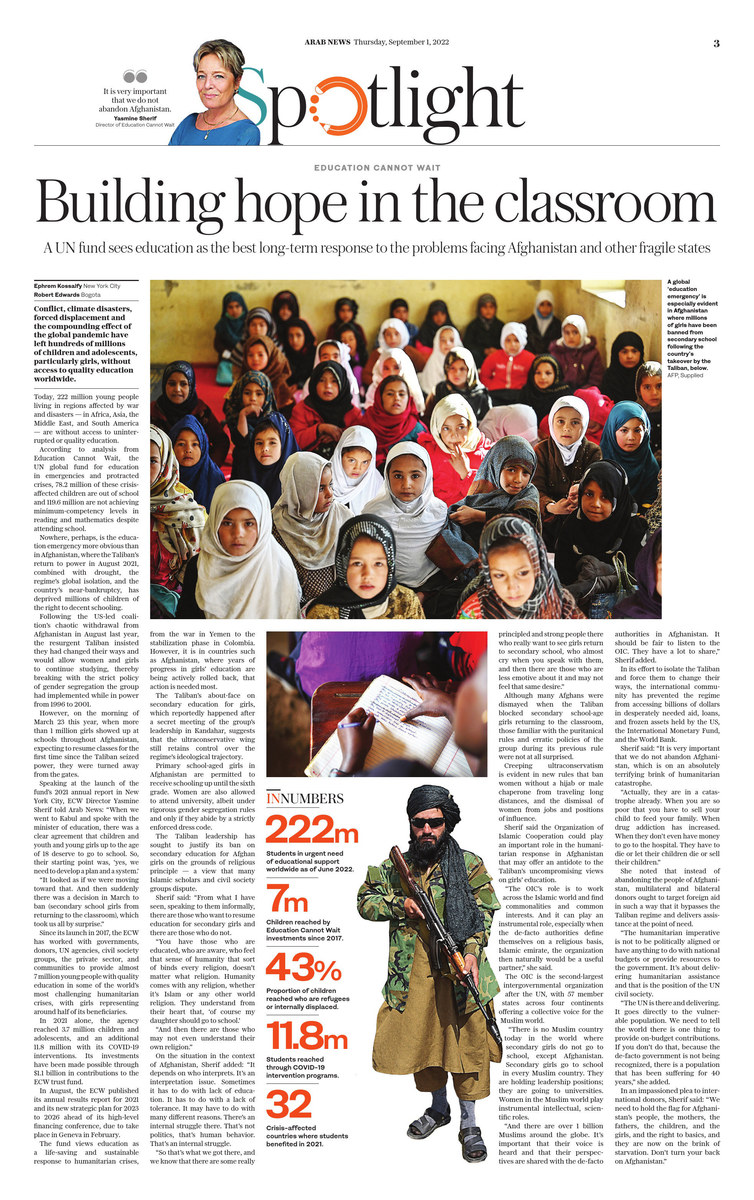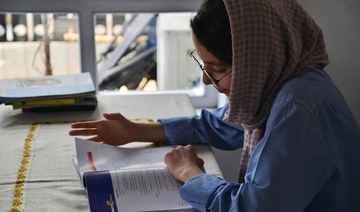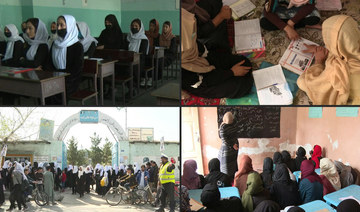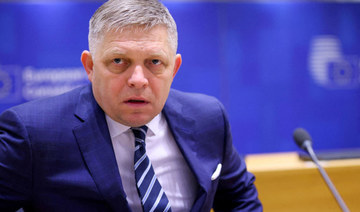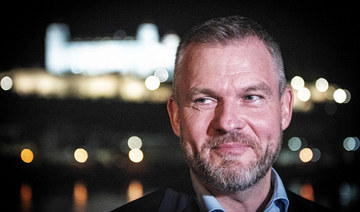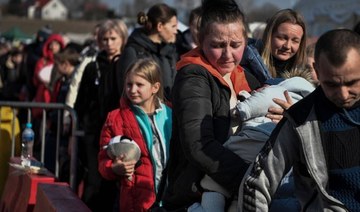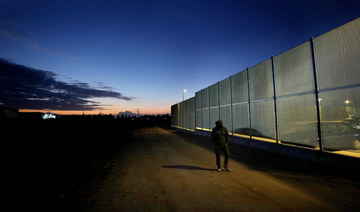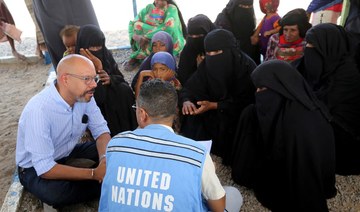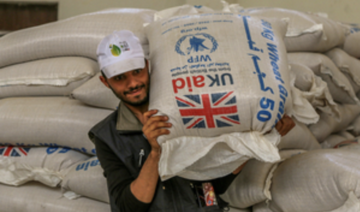NEW YORK CITY/BOGOTA: Conflict, forced displacement, climate-induced disasters, and the compounding effect of the coronavirus pandemic have left hundreds of millions of children and adolescents — particularly girls — without access to quality education worldwide.
Today, 222 million young people living in regions affected by wars and disasters — in Africa, Asia, the Middle East, and South America — are without access to uninterrupted or quality education.
According to analysis by Education Cannot Wait, the UN global fund for education in emergencies and protracted crises, 78.2 million of these crisis-impacted children are out of school and 119.6 million are not achieving minimum-competency levels in reading and mathematics despite attending school.
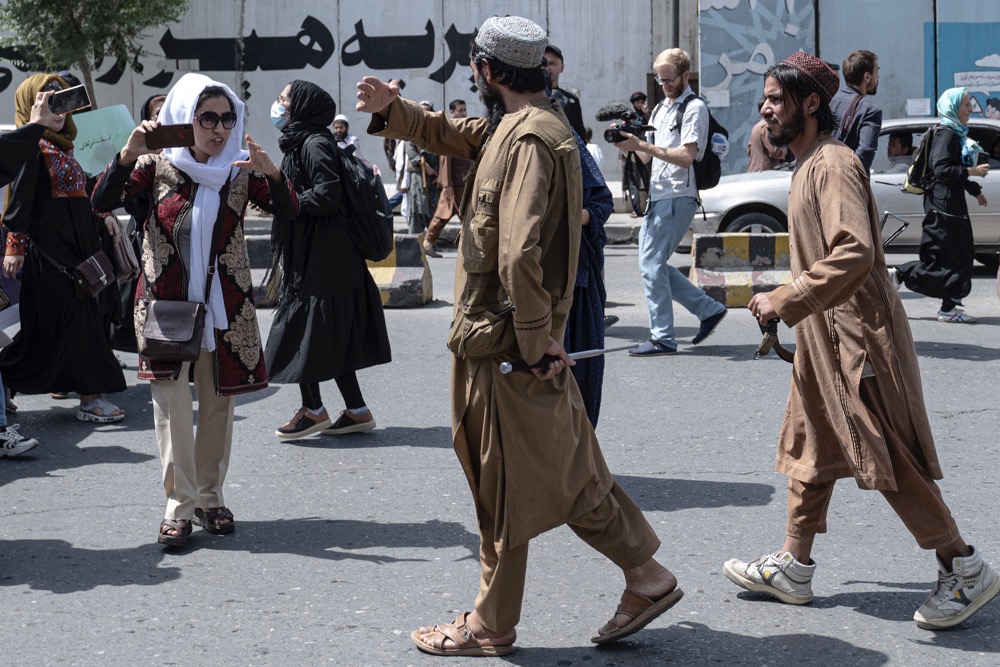
The Taliban’s about-face on secondary education for girls suggests that the ultraconservative wing still retains in control over the regime’s ideological trajectory. (AFP)
Nowhere perhaps is the education emergency more obvious than in Afghanistan, where the Taliban’s return to power in August 2021, combined with drought, the regime’s global isolation, and the country’s near-bankruptcy, has deprived millions of children of the right to decent schooling.
Following the US-led coalition’s chaotic withdrawal from Afghanistan in August last year, the resurgent Taliban insisted they had changed their ways and would allow women and girls to continue studying, thereby breaking with the strict policy of gender segregation the group had implemented while in power from 1996 to 2001.
However, on the morning of March 23 this year, when more than 1 million girls showed up at schools throughout Afghanistan, expecting to resume classes for the first time since the Taliban seized power, they were turned away from the gates.
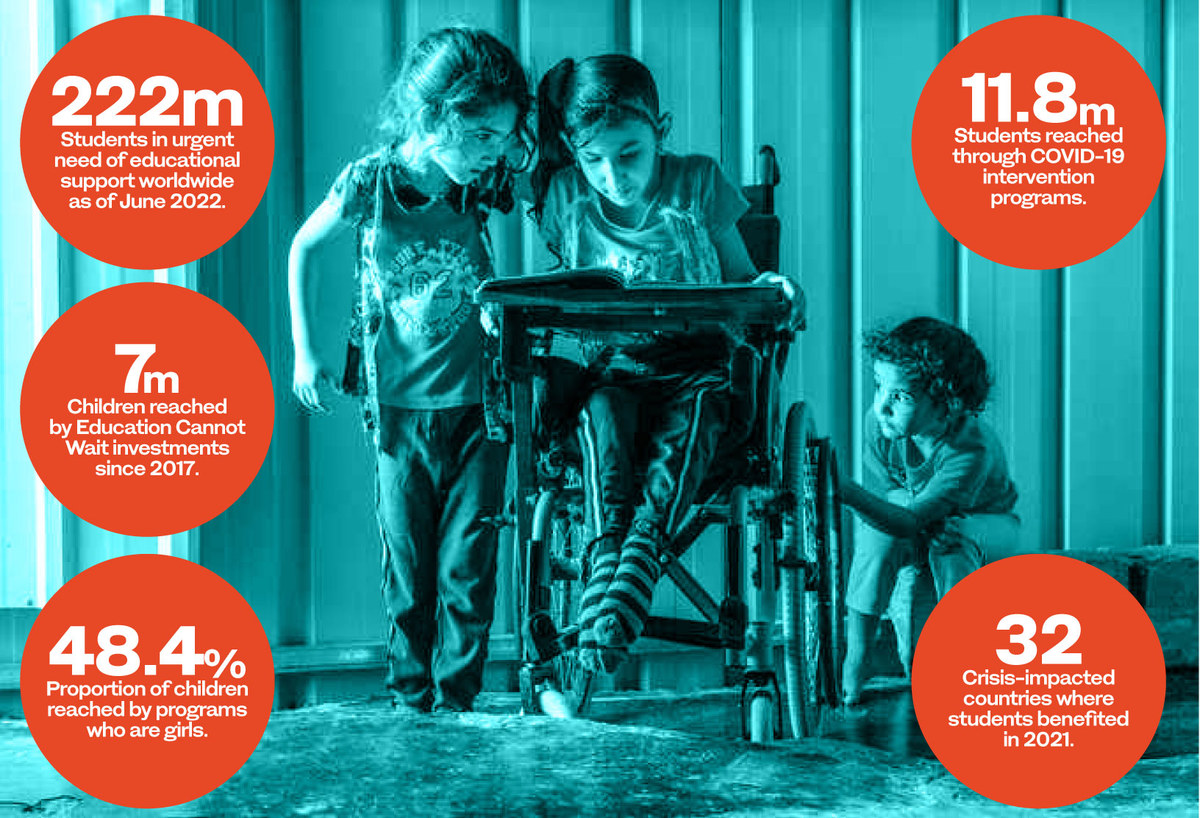
Speaking at the launch of the fund’s 2021 annual report in New York City, ECW Director Yasmine Sherif told Arab News: “When we went to Kabul and spoke with the minister of education, there was a clear agreement that children and youth and young girls up to the age of 18 deserve to go to school. So, their starting point was, ‘yes, we need to develop a plan and a system.’
“It looked as if we were moving toward that. And then suddenly there was a decision in March to ban (secondary school girls from returning to the classroom), which took us all by surprise.”
INNUMBERS
222m Students in urgent need of educational support worldwide as of June 2022.
7m Children reached by Education Cannot Wait investments since 2017.
43% Proportion of children reached who are refugees or internally displaced.
11.8m Students reached through COVID-19 intervention programs.
32 Crisis-affected countries where students benefited in 2021.
Since its launch in 2017, the ECW has worked with governments, donors, UN agencies, civil society groups, the private sector, and communities to provide almost 7 million young people with quality education in some of the world’s most challenging humanitarian crises, with girls representing around half of its beneficiaries.
In 2021 alone, the agency reached 3.7 million children and adolescents, and an additional 11.8 million with its COVID-19 interventions. Its investments have been made possible through $1.1 billion in contributions to the ECW trust fund.
In August, the ECW published its annual results report for 2021 and its new strategic plan for 2023 to 2026 ahead of its high-level financing conference, due to take place in Geneva in February.
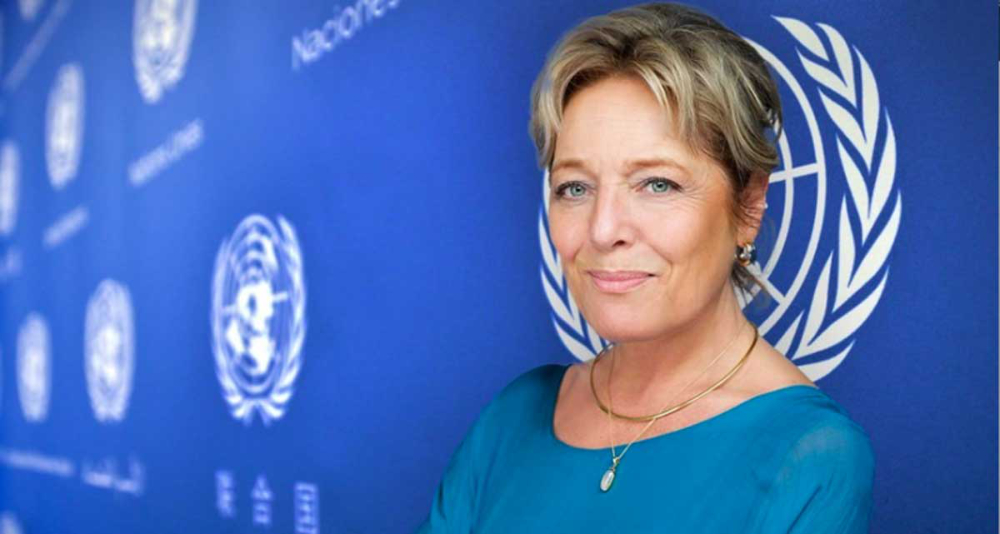
Yasmine Sherif said the Organization of Islamic Cooperation could play an important role in the humanitarian response in Afghanistan. (Supplied)
The fund views education as a life-saving and sustainable response to humanitarian crises, from the war in Yemen to the stabilization phase in Colombia. However, it is in countries such as Afghanistan, where years of progress in girls’ education are being actively rolled back, that action is needed most.
The Taliban’s about-face on secondary education for girls, which reportedly happened after a secret meeting of the group’s leadership in Kandahar, suggests that the ultraconservative wing still retains control over the regime’s ideological trajectory.
Primary school-aged girls in Afghanistan are permitted to receive schooling up until the sixth grade. Women are also allowed to attend university, albeit under rigorous gender segregation rules and only if they abide by a strictly enforced dress code.
The Taliban leadership has sought to justify its ban on secondary education for Afghan girls on the grounds of religious principle — a view that many Islamic scholars and civil society groups dispute.
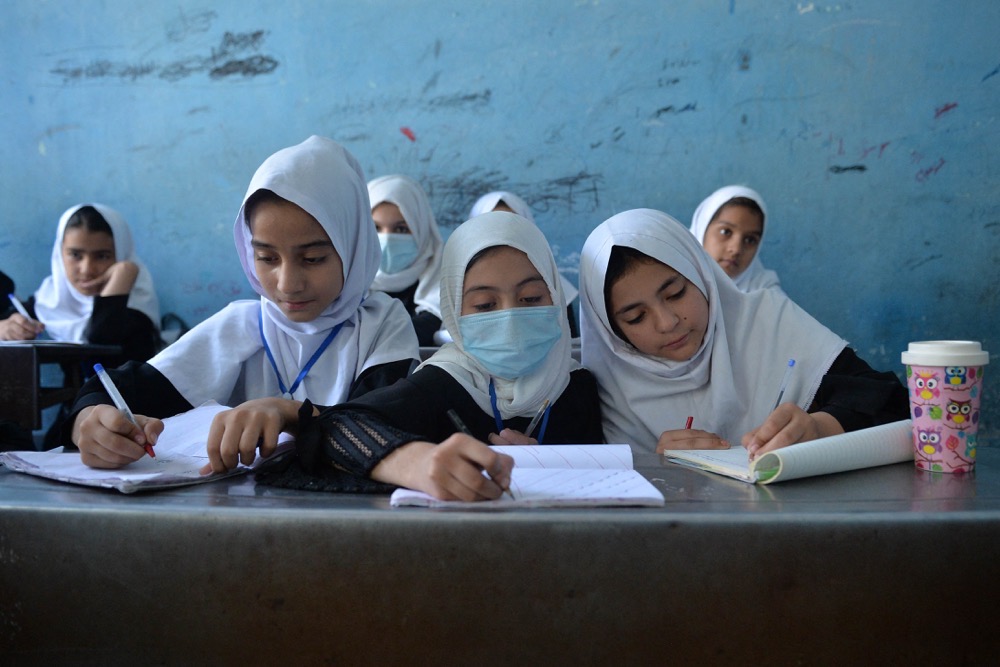
In 2021 alone, Education Cannot Wait reached 3.7 million children and adolescents, and an additional 11.8 million with its COVID-19 interventions. (AFP)
Sherif said: “From what I have seen, speaking to them informally, there are those who want to resume education for secondary girls and there are those who do not.
“You have those who are educated, who are aware, who feel that sense of humanity that sort of binds every religion, doesn’t matter what religion. Humanity comes with any religion, whether it’s Islam or any other world religion. They understand from their heart that, ‘of course my daughter should go to school.’
“And then there are those who may not even understand their own religion.”
On the situation in the context of Afghanistan, Sherif added: “It depends on who interprets. It’s an interpretation issue. Sometimes it has to do with lack of education. It has to do with a lack of tolerance. It may have to do with many different reasons. There’s an internal struggle there. That’s not politics, that’s human behavior. That’s an internal struggle.
SPOTLIGHT: Taliban’s broken promises leave Afghanistan’s schoolgirls and women in despair
“So that’s what we got there, and we know that there are some really principled and strong people there who really want to see girls return to secondary school, who almost cry when you speak with them, and then there are those who are less emotive about it and may not feel that same desire.”
Although many Afghans were dismayed when the Taliban blocked secondary school-age girls returning to the classroom, those familiar with the puritanical rules and erratic policies of the group during its previous rule were not at all surprised.
Creeping ultraconservatism is evident in new rules that ban women without a hijab or male chaperone from traveling long distances, and the dismissal of women from jobs and positions of influence.
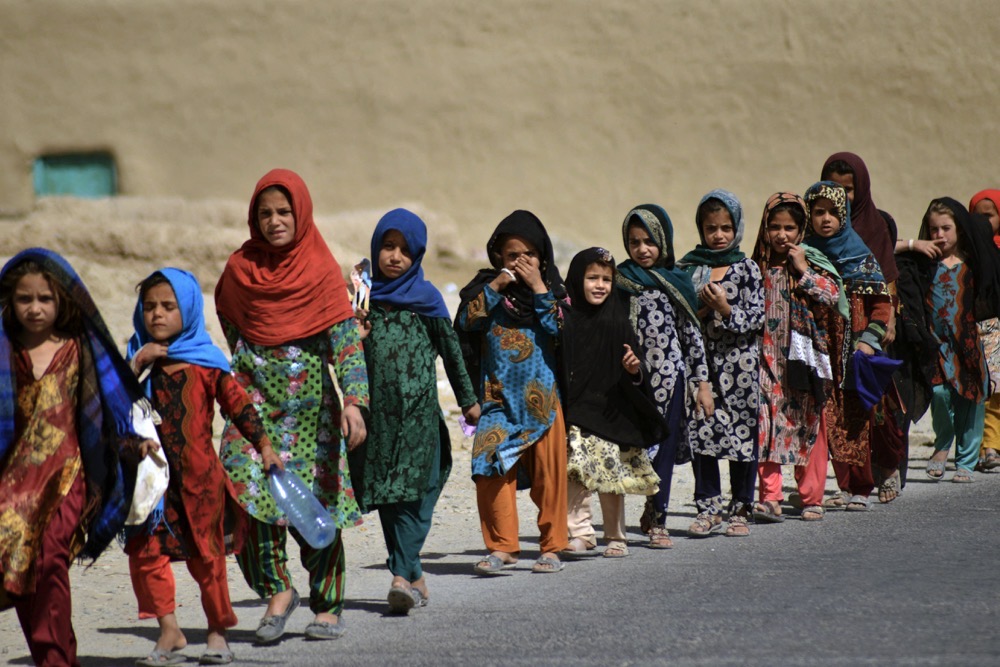
78.2 million crisis-impacted children are out of school, according to Education Cannot Wait. (AFP)
Sherif said the Organization of Islamic Cooperation could play an important role in the humanitarian response in Afghanistan that may offer an antidote to the Taliban’s uncompromising views on girls’ education.
“The OIC’s role is to work across the Islamic world and find commonalities and common interests. And it can play an instrumental role, especially when the de-facto authorities define themselves on a religious basis, Islamic emirate, the organization then naturally would be a useful partner,” she said.
The OIC is the second-largest intergovernmental organization after the UN, with 57 member states across four continents offering a collective voice for the Muslim world.
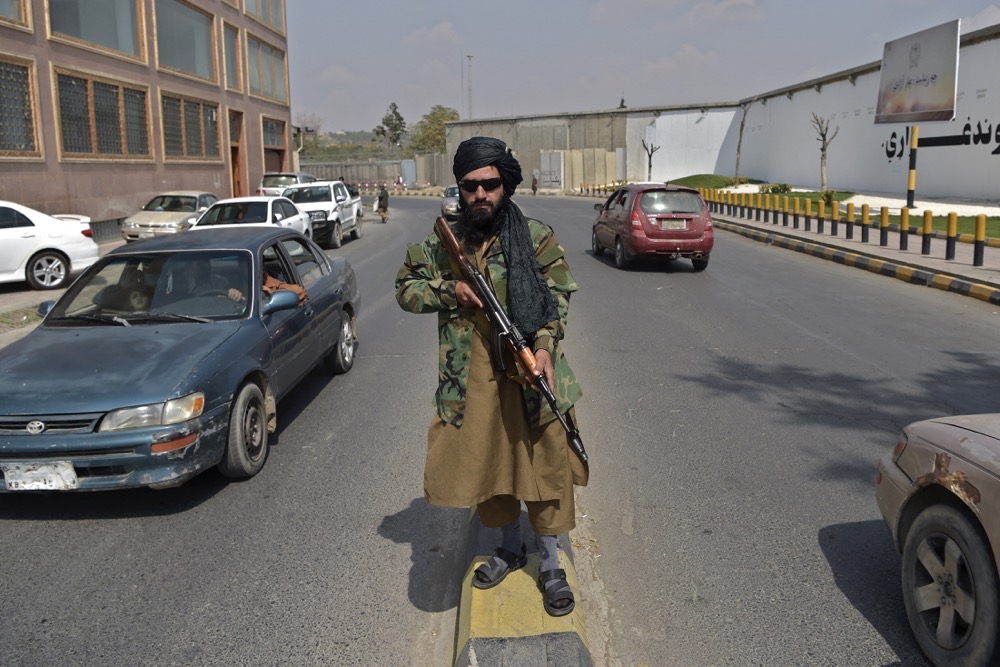
The Taliban leadership has sought to justify its ban on secondary education for Afghan girls on the grounds of religious principle. (AFP)
“There is no Muslim country today in the world where secondary girls do not go to school except Afghanistan. Secondary girls go to school in every Muslim country. They are holding leadership positions; they are going to universities. Women in the Muslim world play instrumental intellectual, scientific roles.
“And there are over 1 billion Muslims around the globe. It’s important that their voice is heard and that their perspectives are shared with the de-facto authorities in Afghanistan. It should be fair to listen to the OIC. They have a lot to share,” Sherif added.
In its effort to isolate the Taliban and force them to change their ways, the international community has prevented the regime from accessing billions of dollars in desperately needed aid, loans, and frozen assets held by the US, the International Monetary Fund, and the World Bank.
Opinion
This section contains relevant reference points, placed in (Opinion field)
Sherif said: “It is very important that we do not abandon Afghanistan, which is on an absolutely terrifying brink of humanitarian catastrophe.
“Actually, they are in a catastrophe already. When you are so poor that you have to sell your child to feed your family. When drug addiction has increased. When they don’t even have money to go to the hospital. They have to die or let their children die or sell their children.”
She noted that instead of abandoning the people of Afghanistan, multilateral and bilateral donors ought to target foreign aid in such a way that it bypasses the Taliban regime and delivers assistance at the point of need.
“The humanitarian imperative is not to be politically aligned or have anything to do with national budgets or provide resources to the government. It’s about delivering humanitarian assistance and that is the position of the UN civil society.
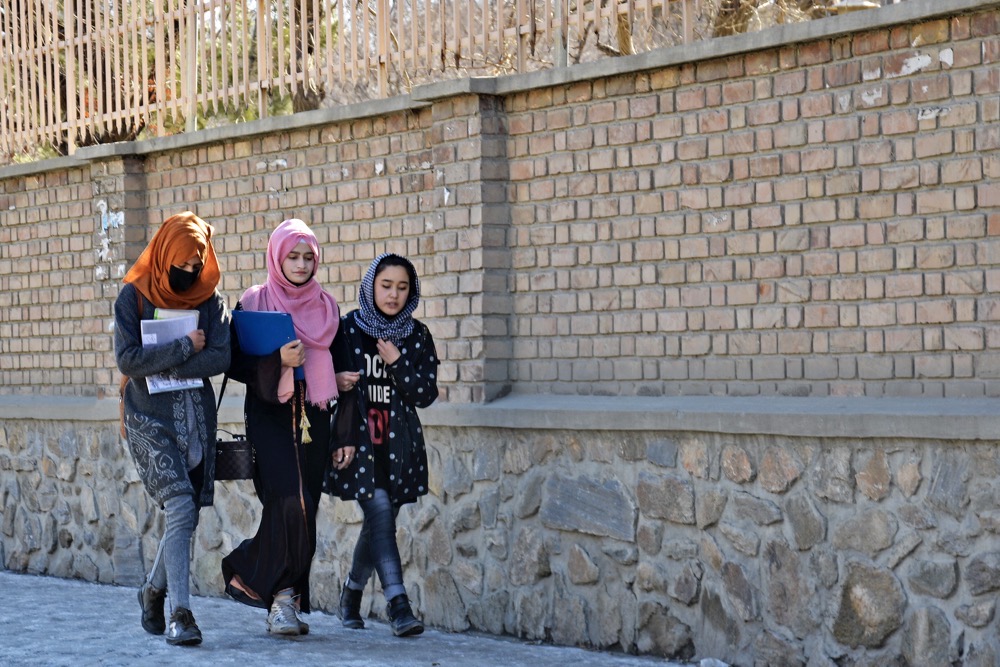
In March, more than 1 million girls in Afghanistan were turned away from school gates across the country. (AFP)
“The UN is there and delivering. It goes directly to the vulnerable population,” Sherif said.
In an impassioned plea to international donors, she added: “We need to hold the flag for Afghanistan’s people, the mothers, the fathers, the children, and the girls, and the right to basics, and they are now on the brink of starvation. Don’t turn your back on Afghanistan.”
